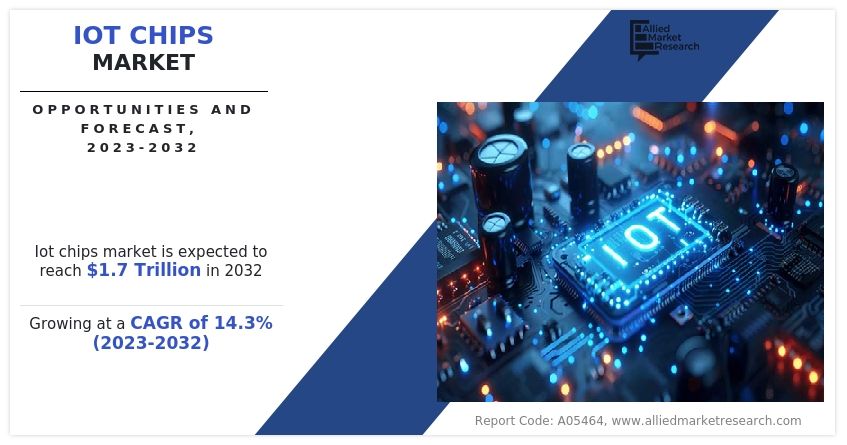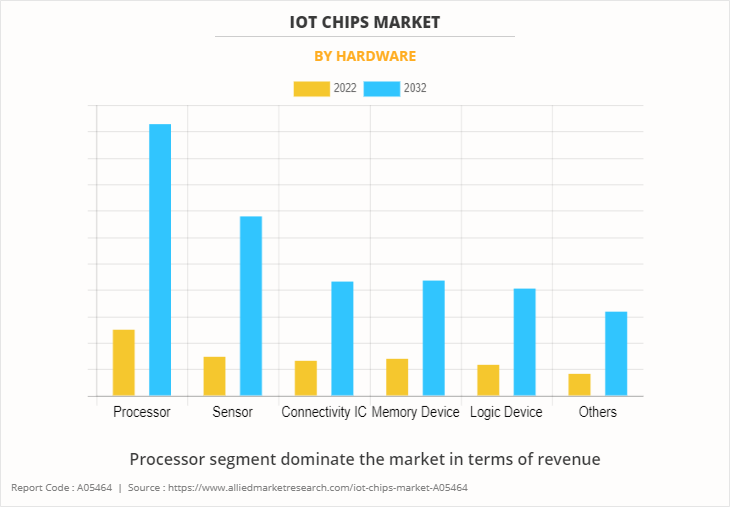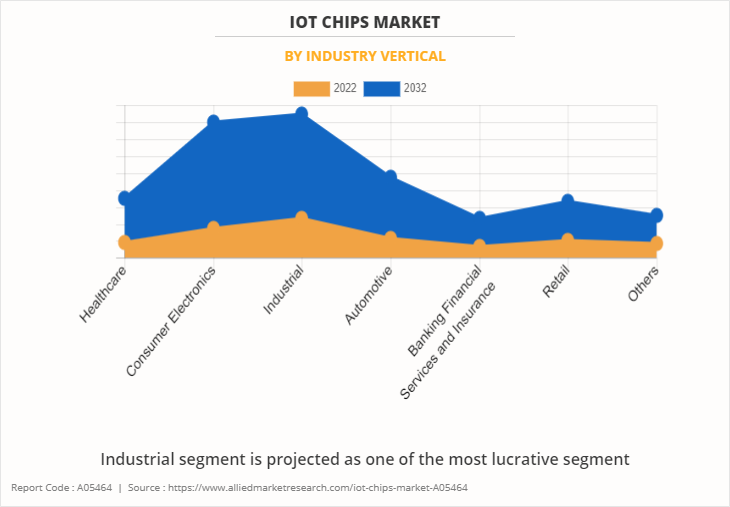IoT Chips Market Research, 2032
The global IoT Chips Market was valued at $432 billion in 2022 and is projected to reach $1.7 trillion by 2032, growing at a CAGR of 14.3% from 2023 to 2032.The increased deployment of 5G networks is a driving force for the IoT chip market. With 5G's enhanced speed, reduced latency, and increased capacity, there is a growing need for IoT chips and 5G IoT chipsets to support the proliferation of interconnected devices.

IoT chip is a specialized integrated circuit embedded in machines, objects, and things. With the help of embedded technologies, such as processors, sensors, connectivity ICs, memory devices, and logic devices, IoT chips are used in IoT sensors and smart gateways to provide connectivity, data processing, and communication. IOT chips are crucial in collecting, transmitting, and processing data within IoT systems.
Key Takeaways of the Internet of Things Chips Market Report
- Based on hardware, the processor segment dominated the IoT chip market in terms of revenue in 2022. However, the sensor segment is anticipated to grow at the fastest CAGR during the forecast period.
- Based on industry vertical, the industrial segment dominated the IoT chip market in terms of revenue in 2022. However, the consumer electronics segment is anticipated to grow at the fastest CAGR during the forecast period.
- Region-wise, North America generated the largest revenue in 2022. However, Asia-Pacific is anticipated to grow at the highest CAGR during the forecast period.
Segment Overview
The IoT chips market is segmented into hardware and industry verticals and regions.
Based on hardware, the IoT chips market is divided into processor, sensor, connectivity IC, memory device, logic device, and others. In 2022, the processor segment dominated the IoT chipset industry in terms of revenue. Moreover, the sensor segment is projected to have the highest CAGR during the forecast period.

Based on industry vertical, the IoT chips market is classified into healthcare, consumer electronics, industrial, automotive, banking, financial services & insurance, retail, and others. In 2022, the industry segment dominated the IoT Chipset Industry in terms of revenue. However, the consumer electronics segment is expected to manifest the highest CAGR during the forecast period.

Based on region, it is analyzed across North America (the U.S., Canada, and Mexico), Europe (the UK, Germany, France, Italy, Spain, and the rest of Europe), Asia-Pacific (China, Japan, India, South Korea, Australia, and rest of Asia-Pacific), Latin America (Brazil, Argentina, and rest of Latin America), and Middle East and Africa (UAE, Saudi Arabia, Qatar, and rest of Middle East and Africa). Asia-Pacific, specifically China, remains a significant participant in the IoT Chipset Industry with a CAGR of 15.77% due to high investments in the consumer electronics sector, which is driving the growth of the IOT chip industry in the Asia-Pacific region.
By Region
North America garnered the highest revenue in 2022
Competitive Analysis
IoT chip makers' profiles include Qualcomm Technologies Inc., STMicroelectronics NV, Samsung Electronics Co. Ltd, Analog Devices Inc., Intel Corporation, Texas Instruments Incorporated, NXP Semiconductors NV, Infineon Technologies AG, MediaTek Inc., and Microchip Technology Inc., which are provided in this report. Product launch and acquisition business strategies were adopted by the major IoT chip manufacturers in 2022. For instance, in June 2021, Qualcomm launched seven of its new IoT chipsets that were targeted at devices meant for logistics, warehousing, smart cameras, video collaboration, and retail. The company stated that these new IoT solutions offer significant capabilities for a wide range of connected solutions and smart devices with extended life hardware and software options to achieve long-term support for a minimum of eight years.
IoT Chips Market Dynamics
Rise in demand for connected devices
The rise in demand for connected devices serves as a significant driving factor for the IoT chips market growth. With the proliferation of IoT applications across various industries, such as healthcare, automotive, agriculture, and smart homes, there is a growing need for devices that can communicate, collect, and process data seamlessly. Connected devices, ranging from smartphones and wearables to sensors and actuators, enable individuals and businesses to access real-time information, automate processes, and enhance productivity. This surge in demand for connected devices is fueled by the increasing adoption of IoT solutions aimed at improving operational efficiency, optimizing resource utilization, and enhancing user experiences. For instance, International Data Corporation (IDC) indicated that worldwide smartphone shipments reached a total of 1.24 billion units in 2022.
High cost of deployment and maintenance
The high cost associated with the deployment and maintenance of IoT chips poses a significant restraint for the IoT chip market. Implementing IoT solutions involves the initial cost of acquiring and integrating IoT devices and ongoing expenses for maintenance, upgrades, and connectivity services. In addition, the complexity of IoT deployments, including factors such as interoperability issues, security concerns, and regulatory compliance, further contributes to the overall cost burden. For businesses, especially small and medium-sized enterprises (SMEs), the upfront investment required for deploying IoT infrastructure can be prohibitive, limiting adoption and hindering IoT chips market growth. Moreover, the lack of standardized pricing models and the uncertainty surrounding the long-term costs of managing IoT ecosystems add to the challenges faced by organizations considering IoT implementations.
Rapid expansion of Industry 4.0
The implementation of Industry 4.0 initiatives and digital transformation strategies presents a significant opportunity for the IoT Chips Growth Projections. Industry 4.0, characterized by the integration of digital technologies into manufacturing and industrial processes, relies heavily on IoT solutions to enable automation, data exchange, and smart decision-making. IoT chips play a significant role in connecting machinery, sensors, and devices on the factory floor, facilitating real-time monitoring, predictive maintenance, and optimization of production processes. As businesses across sectors embrace digital transformation to enhance operational efficiency, reduce costs, and gain competitive advantages, there is a growing demand for IoT chips capable of supporting the connectivity, data processing, and control requirements of Industry 4.0 applications. This presents a lucrative opportunity for IoT chip manufacturers to innovate and develop specialized solutions tailored to the evolving needs of modern industrial environments, driving growth and the IoT chips market expansion in the IoT chip sector. For instance, in July 2022, according to the Economic Times' survey, cellular IoT module chipset shipments grew in India, and Qualcomm led the market with a 42% share. The company has been broadening its 5G IoT chipset portfolio, targeting premium 4G and 5G solutions for verticals such as retail, industrial, and smart cities.
Recent Developments in the IoT Chip Industry
- In May 2022, Cyient partnered with IIT Hyderabad, India (IITH), and WiSig Networks, a start-up company founded in IITH, to launch India's first designed and engineered chip, Koala NB-IoT SoC (Narrowband IoT SoC). The Memorandum of Understanding (MOU) signed between the two aligns with the goals of MEITY (Ministry of Electronics and Information Technology, India) to build a vibrant semiconductor design and innovation ecosystem to serve the Indian world and further promote its development into a global electronics manufacturing and design hub.
- June 2021 - Impinj Inc., which is a RAIN RFID provider and Internet of Things provider, announced the introduction of three new RAIN RFID reader chips that enable IoT device manufacturers to meet the increasing demand for item connectivity in applications such as retail, supply chain and logistics, and consumer electronics, among other markets.
- June 2021 - Qualcomm launched seven of its new IoT chipsets that were targeted at devices meant for logistics, warehousing, smart cameras, video collaboration, and retail, among other applications. The company also stated that these new IoT solutions offer significant capabilities for a wide range of connected solutions and smart devices with extended life hardware and software options to achieve long-term support for a minimum of eight years.
Key Benefits For Stakeholders
- This report provides a quantitative analysis of the IoT chips market segments, current trends, estimations, and dynamics of the IoT chips market from 2022 to 2032 to identify the prevailing IoT chips market opportunity.
- The IoT chips market research is offered along with information related to key drivers, restraints, and opportunities.
- Porter's five forces analysis highlights the potency of buyers and suppliers to enable stakeholders to make profit-oriented business decisions and strengthen their supplier-buyer network.
- In-depth analysis of the IoT chips market segmentation assists in determining the prevailing market opportunities.
- The major IoT chips market size by country in each region is mapped according to their revenue contribution to the global IoT chips market overview
- Market player positioning facilitates benchmarking and provides a clear understanding of the present position of the IoT chips market players.
- The report includes the analysis of the regional as well as global IoT chips market trends, key players of IoT AI chips, IoT AI chips market segments, application areas, and IoT chips market growth strategies.
IoT Chips Market Report Highlights
| Aspects | Details |
| Market Size By 2032 | USD 1.7 trillion |
| Growth Rate | CAGR of 14.3% |
| Forecast period | 2022 - 2032 |
| Report Pages | 250 |
| By Hardware |
|
| By Industry Vertical |
|
| By Region |
|
| Key Market Players | STMicroelectronics NV., Texas Instruments Incorporated, Infineon Technologies AG, Microchip Technology Inc., Analog Devices Inc., Samsung Electronics Co. Ltd, MediaTek Inc., Qualcomm Technologies Inc., Intel Corporation, NXP Semiconductors NV |
Analyst Review
The global IOT chip market holds high potential for the semiconductor industry. The business scenario witnesses an increase in the demand for IOT chip devices, particularly in developing regions, such as China, India, the UAE, and South Africa. Companies in this industry have been adopting various innovative techniques to provide customers with advanced and innovative product offerings.
The IOT chip market is expected to witness notable growth owing to the surge in adoption of IoT devices across various sectors, such as smart homes, healthcare, and industrial automation. On the contrary, the high cost of deployment and maintenance limits the growth of the IOT chip market. Moreover, the surge in demand for IOT chips in the consumer electronics sector is expected to create lucrative opportunities for the key players operating in this market.
The key players profiled in the report include Qualcomm Technologies Inc., STMicroelectronics NV, Samsung Electronics Co. Ltd, Analog Devices Inc., Intel Corporation, Texas Instruments Incorporated, NXP Semiconductors NV, Infineon Technologies AG, MediaTek Inc., and Microchip Technology Inc. These key players have adopted strategies such as product portfolio expansion, mergers & acquisitions, agreements, geographical expansion, and collaborations to enhance their market penetration.
Integration of AI and machine learning algorithms, and increase in demand for edge computing integration are the upcoming trends of IoT chips market in the world.
Industrial segment is the leading application of IoT chips market.
North America is the largest regional market for IOT Chip
In 2022, $432.01 billion is the estimated industry size of IoT Chip.
Qualcomm Technologies Inc., STMicroelectronics NV, Samsung Electronics Co. Ltd, Analog Devices Inc., Intel Corporation, Texas Instruments Incorporated, NXP Semiconductors NV, Infineon Technologies AG, MediaTek Inc., and Microchip Technology Inc are the top companies to hold the market share in IoT Chips
Loading Table Of Content...
Loading Research Methodology...



